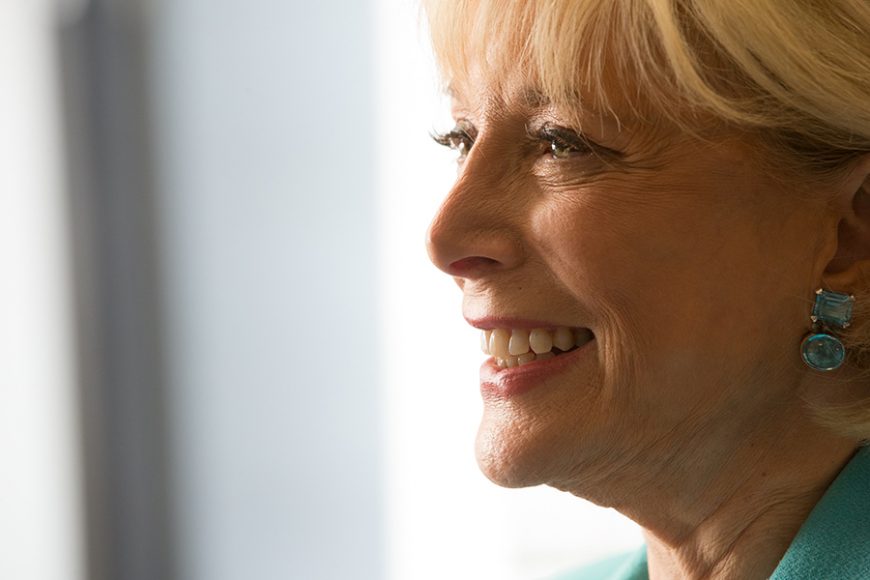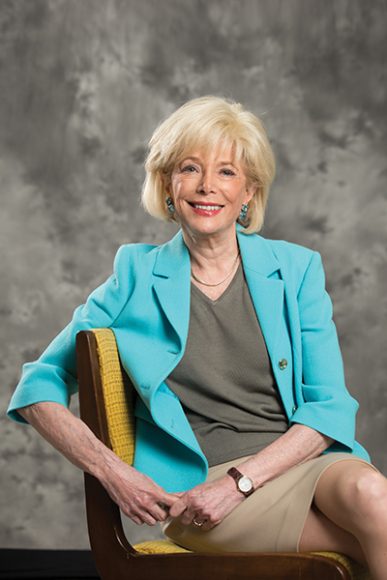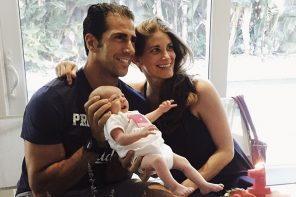She has asked the tough, smart questions of every power player, from President Donald J. Trump (not once but twice) to former French President Nicolas Sarkozy (who walked out on her for bringing up his first marriage) to the “Iron Lady” herself, the late British Prime Minister Margaret Thatcher, who played her “like a flute.”
And yet, it’s fair to say that no one has commanded Lesley Stahl’s attention, to say nothing of her heart, the way a pair of pint-sized charmers have — Jordan and Chloe, her granddaughters. She is head-over-heels in love with them. Moonstruck. Gobsmacked.
“No question,” says the correspondent for CBS’ “60 Minutes,” “and I will tell you every grandmother who reads your article will say, ‘Of course.’”
She is talking at her office at the venerable newsmagazine, a comfortable, synergistic space with commanding views of Manhattan’s ever-evolving West Side; fine, hard-backed chairs; and bookshelves full of presidential biographies, histories and an occasional nod to offbeat subjects like the Mayan ruins. The shelves are punctuated by pictures — Stahl with a shirt-sleeved President Ronald Reagan and with former Vice President Al Gore — and awards like the Edward R. Murrow that tell the story of a storied career. Eight Emmy Awards cluster on a table, gleaming silver and gold. (There are four more at her home.)
“I love my job,” she says. “It’s really important to me. But what has given me the most satisfaction in my life was raising my daughter. And when I think of that baby of mine having babies….Even as I talk to you now, I’m getting a warm feeling.”
GRANDMA’S RULE
Understanding that feeling led Stahl to write her second book, “Becoming Grandma: The Joy and Science of the New Grandparenting” (Blue Rider Press, 2016). (The first, “Reporting Live,” covered her years as CBS News’ White House correspondent during the Carter and Reagan administrations as well as part of George H.W. Bush’s.)
“Grandma” is no touchy-feely memoir, however. Warm, wise, funny and touching, the book finds Stahl picking up her reporter’s notebook as she ranges over anthropology, sociology and science while interviewing celebrated and everyday grandmas to explore the key role of grandmothers in evolutionary history. Becoming a grandmother releases the hormone oxytocin, which aids in the bonding between grandma and grandchild. That’s important, Stahl says, because from prehistoric times to the 1920s “grandmothers have been either helping to raise grandchildren or raising them.” And while several generations may no longer live under one roof in our increasingly global society, the role of the grandmother remains crucial amid single-parent and two-career families. (Just ask Marian Robinson, who anchored granddaughters Malia and Sasha Obama during their father Barack’s presidency.)
“Becoming Grandma” recently brought Stahl to WAG country where she interviewed Sheila Nevins — president of HBO Documentary Films and author of “You Don’t Look Your Age…and Other Fairy Tales” — and was interviewed by her in a benefit for the Bedford Playhouse.
“The two of us disagreed on everything,” Stahl recalls. “The audience thought we were funny. Not because we were funny, but because it was funny.”
Nevins — whose comments appeared in our essay on “The Ripeness of the Older Woman” in July WAG — is not the type to go gently into older womanhood. Whereas Stahl has embraced it. And why not, given that she remains a glamorous, poised blond beauty — only don’t call her “glamma,” the term she uses in her book to describe the indifferent grandmother.
“We all experience a diminution of interest,” Stahl says of society’s (particularly men’s) attentions to the older woman, or lack thereof. “But we bring something else to the table. Sheila reads the dark stories. I read the light ones.”
Stahl doesn’t buy the notion that a journalism career on camera requires beauty, along with brains and talent.
“If you look around the landscape — and I’m not naming names — some female reporters are not beauties. But they are good at what they do. They earned their jobs.”
TRUMP TWICE
Stahl is good at what she does and has earned her job — reporting on stories as diverse as the Guantanamo Bay prison facilities, the Chinese real estate bubble and the Duke University rape scandal in a career that has spanned the White House press pool, the moderator’s chair at “Face the Nation” and, for the last 26 years, a hot seat at “60 Minutes.” (A recent report on the poisoning of Russian dissident Vladimir Kara-Murza was gutsy and chilling.)
It has not been a career for the thin-skinned. She swallowed her pride to audition for “60 Minutes,” then donned a black wig for an undercover story in Romania. She was “treated like a rag doll” by Gen. Norman Schwarzkopf during an interview at the height of the Iraq War. As she recalls being played by Margaret Thatcher — whom she describes as smart, better looking than her photographs and flirtatious with handsome, young men — she can only smile in rueful admiration.
Stahl has been both criticized and praised for her two interviews with Trump — the first after his presidential nomination with vice presidential pick Mike Pence; the second after his victory. She says she encountered two Trumps — leaning forward, interrupting, spoiling for a fight in the first; sitting back, listening, giving thoughtful answers, accompanied only by his aide Hope Hicks for the second. “I respected him for that,” Stahl says of Trump arriving sans entourage.
“My impression was that he was in a state of shock that he won,” she says of the second interview. “It was washing over him. I asked him about it. And he said, ‘No, no, I’m fine.’ But you could see the body language, the weightiness.”
During that interview, she was feeling the pressure of time constraints. But she knows pressure is part of the package. “My job is to ask the tough questions, and let’s hear the answers.” If that earns her criticism and praise across the political spectrum, well, then, she must be doing something right she figures.
The second Trump interview was his first as president elect. In a career of big gets, she hasn’t missed many. The one that got away was Nancy Reagan. Though she interviewed her, Stahl wished she had gotten a chance to explore the key role she played in the Reagan White House. Reagan was criticized for her lavish tastes in china patterns and couture but turned the criticism around, Stahl says.
Another person who has done the seemingly impossible is Peter Martins, ballet master in chief of New York City Ballet, who succeeded “a god,” choreographer George Balanchine, but has kept City Ballet “the premier ballet company in the world when it could’ve been quite different.” (Stahl sits on City Ballet’s board of directors but recused herself for the period when she was preparing a profile on Martins.)
Talking about the superior physicality of dancers, athletes (and older women and grandmothers) today, Stahl says she is mulling a piece about athletes after the glory ends. But that will have to wait. Already, she is in countdown mode for a month on Nantucket with husband Aaron Latham, daughter Taylor, son-in-law Andrew and those grandkids — nothing but sailing, so restorative to this Swampscott, Massachusetts, native; collecting and painting seashells; cuddling while reading “Charlotte’s Web” and the “Ramona” books; and relishing plenty of treats. (Would she consider adopting us?)
Because “Becoming Grandma” means never having to say “no” to frozen yogurt.
For more, visit cbsnews.com/60-minutes/.






